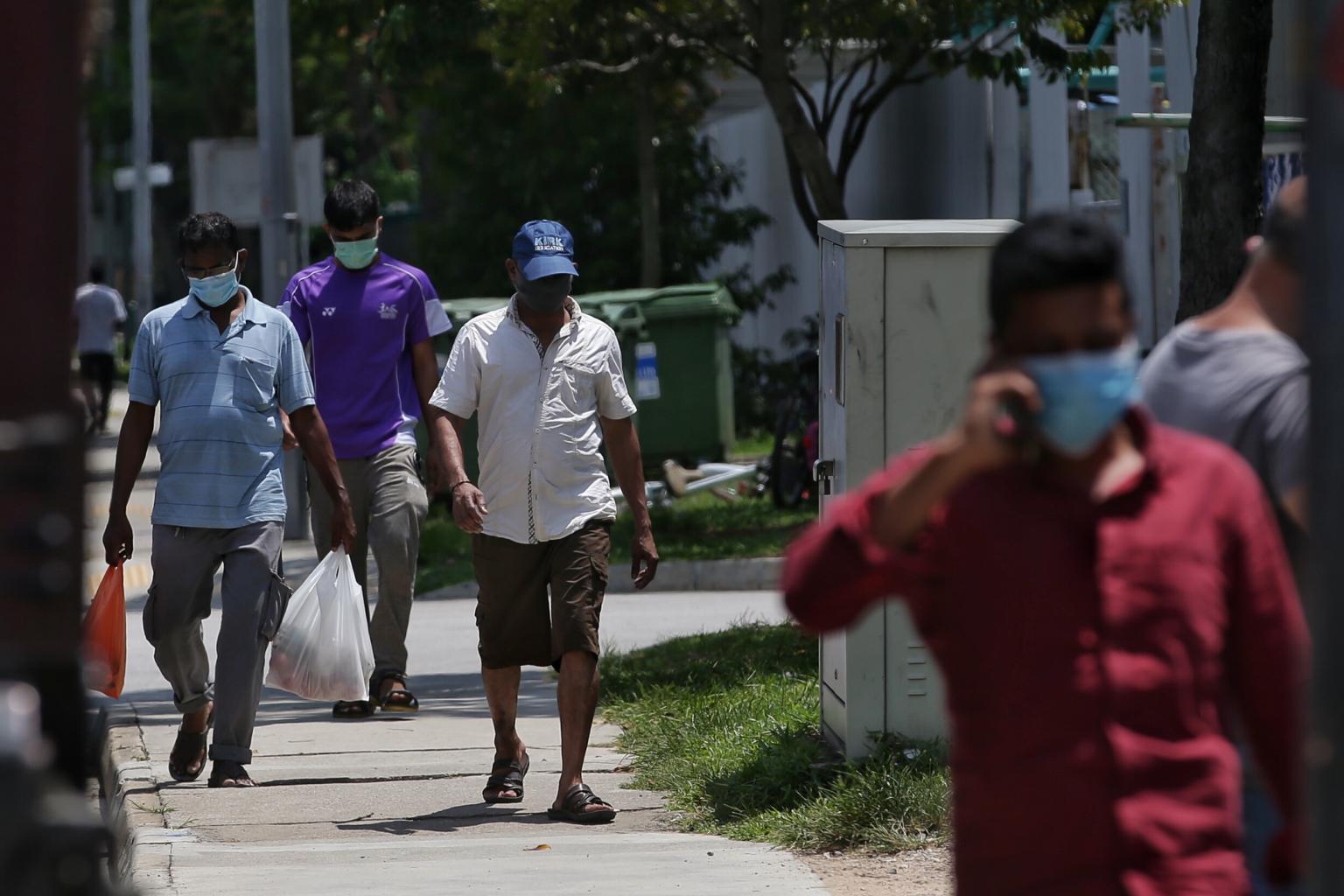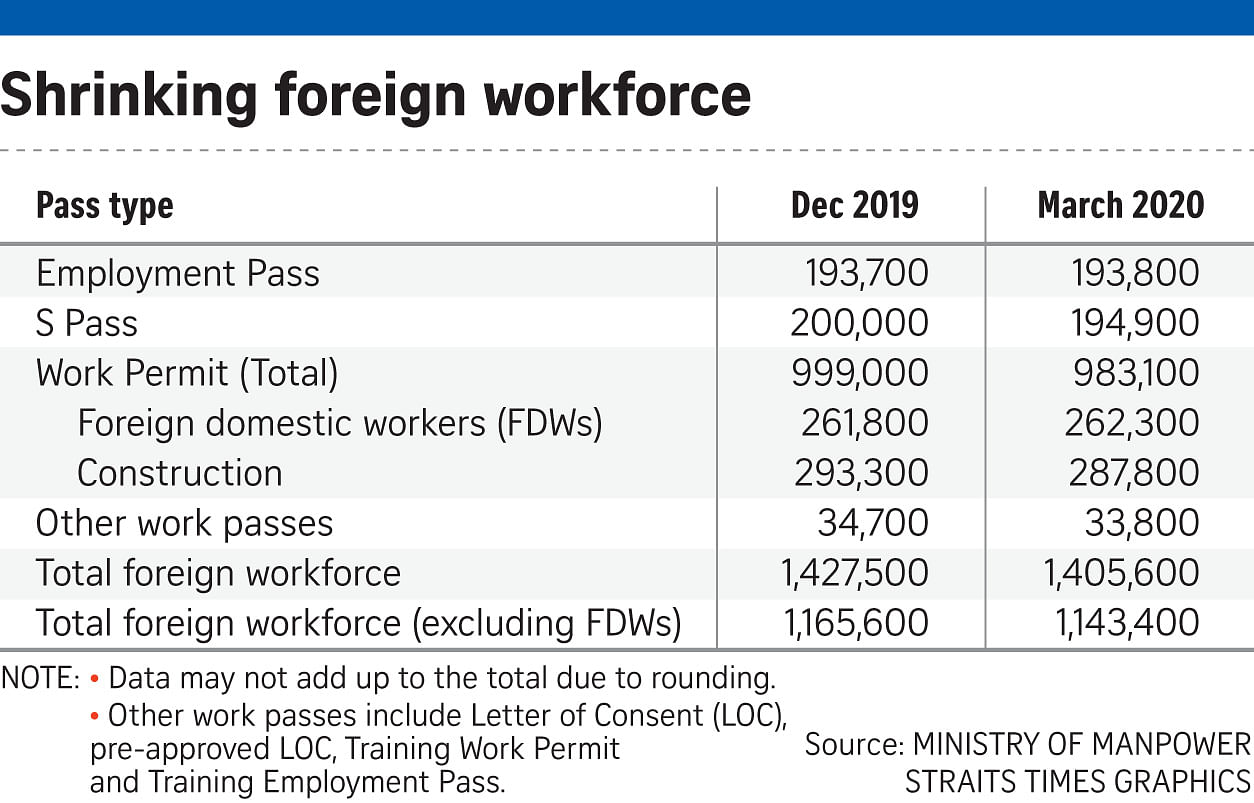Coronavirus: Singapore firms trying to retain foreign staff, but this group likely first to go
Sign up now: Get ST's newsletters delivered to your inbox

Foreign workers make their way to an eating house at Kian Teck Avenue on April 16, 2020.
ST PHOTO: KEVIN LIM
Companies are trying to hold on to their foreign workforce despite cost pressures from the circuit breaker, but if push comes to shove, this group could be the first to go, say employers and human resource experts.
Such workers are a mainstay of the economy, with around 1.15 million employed here, including those on employment passes, S passes and work permits. The number excludes foreign domestic workers.
There have been reports of cost cutting and retrenchments amid the uncertainty of the pandemic and, typically, the first of such cuts would land on the foreign workforce, said Mr David Leong, managing director of human resources firm PeopleWorldwide Consulting.
While the Government has implemented foreign worker levy rebates and waivers to help companies retain these workers, the key Jobs Support Scheme (JSS) of wage subsidies covers only local employees.
Mr Lee Quane, regional director for Asia at human resources consultancy ECA International, said foreigners employed in the tourism, food and beverage, and transportation industries will very much be at risk of retrenchment.
He noted that these are among the sectors that not only employ relatively large numbers of foreigners, but are also most affected by the coronavirus pandemic.
He added that these workers are in roles where it is difficult to recruit enough locals, so the risk depends on how fast the recovery is expected to come for their sector.
Some employers are trying to retain their foreign workforce although many are already struggling to keep their businesses afloat and wonder how long they can hold out.
Mr Abdul Sukkoor, who employs 28 people from Malaysia and India on work permits or S passes, said turnover has plunged by half across his five Mr Prata branches.
Paying his 50 employees their full salaries has eaten into about 30 per cent of the restaurant's total profit margins. "We just need to survive for the next month and, hopefully, things pick up by June," he said, adding that he needs to retain staff to be ready for when business goes back to normal.

Similarly, security agency boss Gary Haris, who employs about 200 Malaysians, has had to use the company's savings to pay officers and house those who are unable to return home due to Malaysia's movement control order.
Other companies have had to trim their workforce.
Mr Edwin Sudhakar, head of human resources for Asia-Pacific, Australia and New Zealand at IT services firm Virtusa, said that when projects end, some of the foreign staff involved move to Virtusa units in their home countries if there are opportunities. It will be challenging to find opportunities for the rest as business is slow, he said.
A handful have also asked about moving home as they were anxious to be with their families during the pandemic.
The total number of foreigners employed here, excluding foreign domestic workers, dropped by 22,200 between last December and March, said the Manpower Ministry.

One reason is that travel curbs to prevent imported cases of the virus have prevented some workers from returning, said Manpower Minister Josephine Teo last month.
Such restrictions worldwide have left some companies scrambling to replace the temporary manpower shortfall as workers choose to remain in their home countries.
Security firm Aetos has had to redeploy and tap its reserve pool of officers to fill in for its Malaysian officers who are still in Malaysia.
Mr Quane said the JSS will help employers manage overall manpower costs, although it does not directly reduce the expense of employing individual foreigners.
But some foreigners already face difficulties holding on to or securing jobs during this time.
A 29-year-old Filipino who gave his name only as John had his S Pass cancelled on April 15, two days after his employer, a legal solutions firm, told staff it had filed for liquidation.
While it is not clear if the job loss was directly due to the Covid-19 situation, this meant that John had only the span of his 30-day short-term visit pass to find another job.
"We were ready for cost cutting, but this was a shock. Even if they had cut my pay by $300, at least I would still have a job," said John.
"It's not possible to find a job in the middle of the circuit breaker. I don't think businesses will accept foreigners when they are cost cutting, especially when they have to pay our salary and the levy (after the waiver and rebates end)."
He plans to return to the Philippines this week after drawing down his savings to settle his taxes and bills, as the job hunt and applications to extend his pass have been unsuccessful.


